六年级英语复习资料3
PEP人教版小学六年级毕业班英语复习资料(三至六年级)
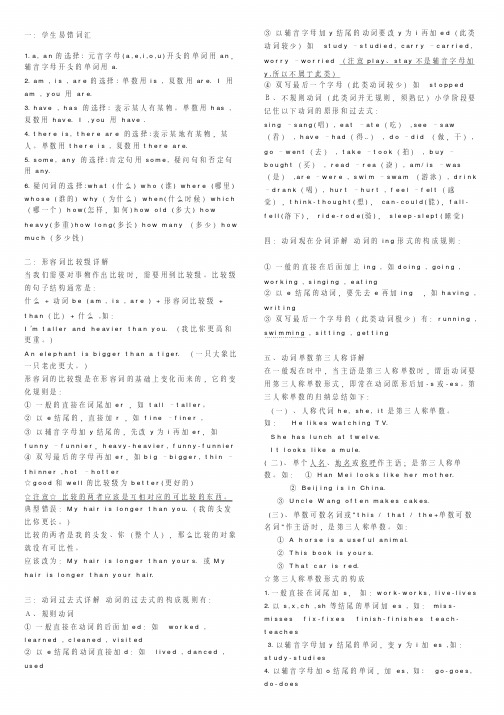
一:学生易错词汇1.a,a n的选择:元音字母(a,e,i,o,u)开头的单词用a n,辅音字母开头的单词用 a.2.a m,i s,a r e的选择:单数用i s,复数用ar e.I用a m,y o u用a r e.3.h a v e,h a s的选择:表示某人有某物。
单数用h as,复数用h a v e.I,y ou用h a v e .4.t h e r e i s,t h e r e a r e的选择:表示某地有某物,某人。
单数用t h e r e i s,复数用t h e r e a r e.5.s o m e,a n y的选择:肯定句用s o m e,疑问句和否定句用a n y.6.疑问词的选择:w h a t(什么)w h o(谁)w h e r e(哪里) w h o s e(谁的)w h y(为什么)w h e n(什么时候)w h i c h (哪一个)h o w(怎样,如何)h o w o l d(多大)h o wh e a v y(多重)h o w l o n g(多长)h o w m a n y(多少)h o w m u c h(多少钱)二:形容词比较级详解当我们需要对事物作出比较时,需要用到比较级。
比较级的句子结构通常是:什么+动词b e(a m,i s,a r e)+形容词比较级+t h a n(比)+什么,如:I’m t a l l e r a n d h e av i e r t h a n y o u.(我比你更高和更重。
)A n e l e p h an t i s b i g g e r t h a n a t i g e r.(一只大象比一只老虎更大。
)形容词的比较级是在形容词的基础上变化而来的,它的变化规则是:①一般的直接在词尾加e r,如t a l l–t a l l e r。
②以e结尾的,直接加r,如f i n e–f i n e r,③以辅音字母加y结尾的,先改y为i再加e r,如f u n n y–f u n n i e r,h e a v y-h e a v i e r,f u n n y-f u n n i e r④双写最后的字母再加e r,如b i g–b i g g e r,t h i n–t h i n n e r,h o t–h o t t e r☆g o o d和w e l l的比较级为b e t t e r(更好的)☆注意☆比较的两者应该是互相对应的可比较的东西。
小学英语六年级下学期(牛津译林版)Unit 3-4复习资料
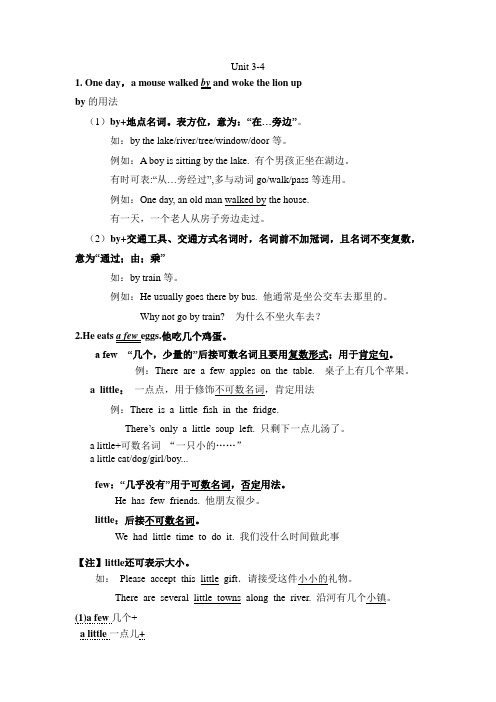
Unit 3-41. One day,a mouse walked by and woke the lion upby的用法(1)by+地点名词。
表方位,意为:“在…旁边”。
如:by the lake/river/tree/window/door等。
例如:A boy is sitting by the lake. 有个男孩正坐在湖边。
有时可表:“从…旁经过”,多与动词go/walk/pass等连用。
例如:One day, an old man walked by the house.有一天,一个老人从房子旁边走过。
(2)by+交通工具、交通方式名词时,名词前不加冠词,且名词不变复数,意为“通过;由;乘”如:by train等。
例如:He usually goes there by bus. 他通常是坐公交车去那里的。
Why not go by train? 为什么不坐火车去?2.He eats a few eggs.他吃几个鸡蛋。
a few “几个,少量的”后接可数名词且要用复数形式;用于肯定句。
例:There are a few apples on the table. 桌子上有几个苹果。
a little:一点点,用于修饰不可数名词,肯定用法例:There is a little fish in the fridge.There’s only a little soup left. 只剩下一点儿汤了。
a little+可数名词“一只小的……”a little cat/dog/girl/boy...few:“几乎没有”用于可数名词,否定用法。
He has few friends. 他朋友很少。
little:后接不可数名词。
We had little time to do it. 我们没什么时间做此事【注】little还可表示大小。
如:Please accept this little gift.请接受这件小小的礼物。
小学英语新外研版(一起)六年级上册M3M4基础知识梳理
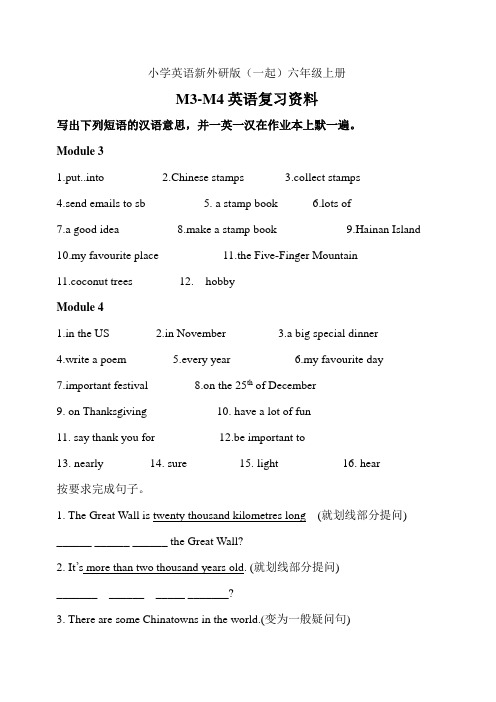
小学英语新外研版(一起)六年级上册M3-M4英语复习资料写出下列短语的汉语意思,并一英一汉在作业本上默一遍。
Module 31.put..into2.Chinese stamps3.collect stamps4.send emails to sb5. a stamp book6.lots of7.a good idea 8.make a stamp book 9.Hainan Island10.my favourite place 11.the Five-Finger Mountain11.coconut trees 12. hobbyModule 41.in the US2.in November3.a big special dinner4.write a poem5.every year6.my favourite day7.important festival 8.on the 25th of December9. on Thanksgiving 10. have a lot of fun11. say thank you for 12.be important to13. nearly 14. sure 15. light 16. hear按要求完成句子。
1. The Great Wall is twenty thousand kilometres long (就划线部分提问) ______ ______ ______ the Great Wall?2. It’s more than two thousand years old. (就划线部分提问)_______ ______ _____ _______?3. There are some Chinatowns in the world.(变为一般疑问句)_______ ______ _______ Chinatowns in the world?4. We ate in a Chinese restaurant. (变为一般疑问句)_____ you _____ in a Chinese restaurant?5. We saw a lion dance in the street. (就划线部分提问)______ ______ you ________ in the street?6. James went to a library yesterday. (就划线部分提问)_______ ______ James _____ yesterday?7. I’m putting my new books into my bag. (就划线部分提问) ______ ______ ______ ________ ?8. There are some apples on the table. (一般疑问句)_____ _______ ______ _______ on the table?9. I have got some stamps from England. (就划线部分提问) _____ _______ you _______ ?10 Have you got any kites? (做否定回答)______, ______ ______11. Can you tell me about Christmas? (做肯定回答)______, _____ _______。
PEP人教版小学六年级毕业班英语复习资料(三至六年级)
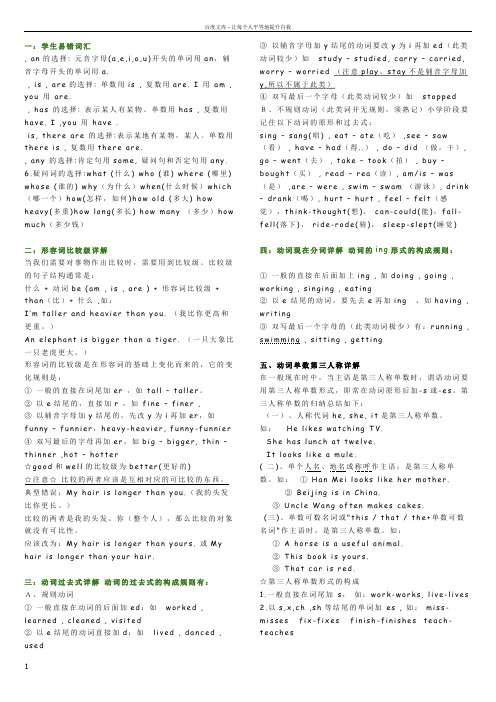
百度文库 - 让每个人平等地提升自我1一:学生易错词汇, a n 的选择: 元音字母(a ,e ,i ,o ,u )开头的单词用a n ,辅音字母开头的单词用a., i s , a r e 的选择: 单数用i s , 复数用a r e. I 用 a m , y o u 用 a r e., h a s 的选择: 表示某人有某物。
单数用h a s , 复数用h a v e. I ,y o u 用 h a v e .i s , t h e r e a r e 的选择:表示某地有某物,某人。
单数用t h e r e i s , 复数用t h e r e a r e., a n y 的选择:肯定句用s o m e , 疑问句和否定句用a n y. 6.疑问词的选择:w h a t (什么) w h o (谁) w h e r e (哪里) w h o s e (谁的) w h y (为什么)w h e n (什么时候)w h i c h (哪一个)h o w (怎样,如何)h o w o l d (多大) h o w h e a v y (多重)h o w l o n g (多长) h o w m a n y (多少)h o w m u c h (多少钱)二:形容词比较级详解当我们需要对事物作出比较时,需要用到比较级。
比较级的句子结构通常是:什么 + 动词b e (a m , i s , a r e ) + 形容词比较级 + t h a n (比)+ 什么 ,如:I ’m t a l l e r a n d h e a v i e r t h a n y o u. (我比你更高和更重。
)A n e l e p h a n t i s b i g g e r t h a n a t i g e r. (一只大象比一只老虎更大。
)形容词的比较级是在形容词的基础上变化而来的,它的变化规则是:① 一般的直接在词尾加e r ,如 t a l l – t a l l e r 。
六年级unit3总复习资料

必背句子1.I fell off my bike last Saturday and hurt my foot.我从自行车上摔了下来,伤了我的脚。
e and look at my photos from the Labour Day holiday.过来看看我劳动节的照片。
3.Where did you go over the winter holiday ?寒假期间你去哪啦?4.What did you do ?你干什么了?5.I rode a horse.我骑马啦。
6.It looks like a mule.它看起来像头骡子。
7.Did you go to Turpan ?你/你们去吐鲁番了吗?8.We saw lots of grapes there.我们在那看见了许多葡萄。
9.They won’t be ready till August.他们直到八月份才能成熟。
10.My family and I went to Sanya.我家人和我去三亚了。
11.Hainan is far from here.海南离这很远。
12.How did you go there ?你/你们怎么样去得那?13.We went there by plane.我们乘飞机去得那。
14.I took lots of pictures.我拍了许多照片。
15.I also went swimming.我也去游泳了。
16.Can I see your pictures sometime ? 我将来某个时候能看看你的照片吗?17.We rode a bike for three people.我们骑了一辆三人自行车。
18.Max sat in a basket on the front of the bike.麦克斯坐在自行车前面的筐里。
19.We took pictures of the beautiful countryside.我们照了美丽乡村的照片。
沪教版六年级英语复习资料(已标注重点)
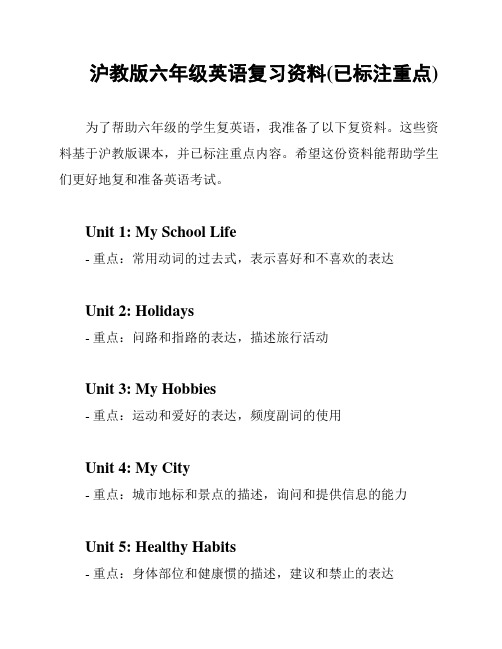
沪教版六年级英语复习资料(已标注重点)
为了帮助六年级的学生复英语,我准备了以下复资料。
这些资料基于沪教版课本,并已标注重点内容。
希望这份资料能帮助学生们更好地复和准备英语考试。
Unit 1: My School Life
- 重点:常用动词的过去式,表示喜好和不喜欢的表达
Unit 2: Holidays
- 重点:问路和指路的表达,描述旅行活动
Unit 3: My Hobbies
- 重点:运动和爱好的表达,频度副词的使用
Unit 4: My City
- 重点:城市地标和景点的描述,询问和提供信息的能力
Unit 5: Healthy Habits
- 重点:身体部位和健康惯的描述,建议和禁止的表达
Unit 6: At the Zoo
- 重点:描述动物的外貌和行为,询问和提供信息的能力
Unit 7: Food and Drinks
- 重点:食物和饮料的名称,句式“What do you want?”的用法
Unit 8: My Family
- 重点:家庭成员和关系的描述,家庭活动的表达
Unit 9: My Daily Routine
- 重点:日常活动的表达,日常时间的描述
Unit 10: Jobs
- 重点:职业名称和工作内容的描述,询问和回答关于职业的问题
以上是本复资料的主要内容。
希望学生们能通过复这些重点内容来巩固英语知识,取得优异的成绩。
祝大家研究愉快!
(注意:本文档内容仅供复习参考,具体考试内容以教材为准。
)。
EEC英语六年级上册复习资料第三课

Lesson 3 Can I try this shirt on?一、单词1.shirt衬衫2.purple紫色3.gray灰色4.shop商店5.better比较好6.juice果汁7.pear鸭梨8.country国家9.world世界10.river河流11.long长的12.arrive到达13.give给14.fit适合15.center中心二、短语1.go into走进2.try on试穿3.of course当然4.too small太小5.too big太大6.too long太长7.too short太短8.look good看上去很好9.look good on sb看起来与某人很相配10.fitting room试衣间11.over there在那边12.ice cream冰淇淋13.those pants那条裤子14.in China在中国15.in the world在世界上16.after school放学后17.go shopping去购物18.arrive at到达19.shopping center购物中心三、句子Let’s Have Fun 1Mom, I like that shirt.妈妈,我喜欢那条裙子。
Let’s go into the shop.让我们进商店看看吧。
Which do you like better, the purple one or the gray one?你比较喜欢哪件,是紫的的还是灰色的?I like the purple one better.我比较喜欢紫色的。
Can I try this shirt on?我能试穿这件衬衫吗?Of course.当然可以。
The fitting room is over there.试衣间在那边。
Let’s Practice 1Which do you like better, the purple car or the gray car? 你比较喜欢哪辆小汽车,是紫色的还是灰色的?I like the purple car better.我比较喜欢紫色的小汽车。
pep小学英语六年级上册复习资料

pep小学英语六年级上册复习资料PEP小学英语六年级上册复习资料随着小学六年级上册英语学习的逐渐结束,孩子们即将迎来期末考试。
为了帮助孩子们更好地复习,本文将提供一些PEP小学英语六年级上册的复习资料,希望能对孩子们的学习有所帮助。
一、基础词汇复习在六年级上册的学习中,孩子们已经掌握了一定的英语词汇量。
在复习过程中,可以通过词汇卡片的方式进行记忆。
将单词写在卡片上,一面写英文,一面写中文,然后将卡片翻过来,通过读英文来回忆中文的意思。
可以通过这种方式来巩固词汇。
二、语法知识复习除了词汇外,语法知识也是英语学习中非常重要的一部分。
在复习过程中,可以通过做一些语法练习来加深对语法知识的理解。
例如,练习使用动词的不同时态,练习使用不同的句型结构等等。
通过这些练习,可以帮助孩子们更好地掌握语法知识。
三、听力训练在六年级上册的学习中,听力训练是非常重要的一环。
通过听力训练,可以提高孩子们的听力理解能力,帮助他们更好地理解英语的听力材料。
可以通过听录音并回答问题的方式来进行听力训练。
还可以通过听故事、听对话等方式来提高听力技巧。
四、口语练习口语练习是英语学习中非常关键的一环。
通过口语练习,可以提高孩子们的口语表达能力,培养他们的英语口语思维。
可以通过角色扮演、对话练习等方式来进行口语练习。
还可以通过与同学或老师进行英语对话来提高口语水平。
五、阅读理解阅读理解是英语学习中非常重要的一项技能。
通过阅读理解练习,可以帮助孩子们提高阅读理解能力,培养他们的阅读习惯。
可以通过阅读短文并回答问题的方式来进行阅读理解练习。
还可以通过阅读故事、文章等来提高阅读理解能力。
六、写作训练写作是英语学习中培养孩子们语言表达能力的重要环节。
通过写作训练,可以提高孩子们的写作能力,培养他们的写作思维。
可以通过写日记、写作文等方式来进行写作训练。
还可以通过与同学或老师进行英语写作交流来提高写作水平。
以上是对PEP小学英语六年级上册的复习资料的介绍。
沪教版六年级英语上册3-5单元复习资料

Unit 3 Spending a day out together 1. spend a day out together ⼀起在外度过⼀天. spend v. 花费 à spending n. 开销,花费 spend a day out 花⼀天时间外出 2. on Green Island 在绿岛上 island n. 岛屿 on Lucky Island 在幸运岛上lucky a. 幸运的 à luck n.运⽓ luckily ad. 幸运地 unlucky a. 不幸的à unluckily ad.不幸地 3. in Happy Town 在快乐城 4. in Dragon Bay 在龙湾 bay n. 海湾 dragon n. 龙à dragon boat 龙⾈ 5. on Lucky Island / in Sandy Bay / in Happy Town/ at the seaside 不同的地点前使⽤不同的介词 6. at weekends = at the weekend = on Saturday or Sunday 在周末 weekend n. 周末 weekday n.⼯作⽇ at weekends在周末 on weekdays在⼯作⽇ 7. be near sp. 离开某地近的 8. be far (away) from sp 离开某地远的 9. Seaside Town 海边镇 seaside n. 海滨à seashore n. 海岸,海滨 10. a photo of my family and me ⼀张我家⼈和我的照⽚ 11. have lunch together ⼀起吃午饭 12. Green Market 格林市场 13. In Sunny Town 在太阳城 14. Space Museum 太空博物馆 space n. 空间à spacious a. 宽敞的 15. In Moon Town 在⽉亮城 16. an activity ⼀项活动 activity n. 活动à act n./v.⾏为,活动à actor n. 男演员à actress n. ⼥演员 17. have a barbecue 进⾏⼀次烧烤 18. fly kites 放风筝 19. ride bicycles 骑⾃⾏车 20. make sandcastles 筑沙堡 21. collect shells 收集贝壳 collect v. 收集 à collection n.收集,收集的东西 22. make an album 制作⼀本照⽚簿 album n. 相册,唱⽚àphoto album 相册 23. plan to do sth. 计划做某事 24. a good idea ⼀个好主意 25. which place 哪⼀个地⽅ 26. plan a trip 计划⼀次旅⾏ 27. How about… ……怎么样?(常⽤于表⽰建议或提议) 28. be going to + v. 打算做… 29. a.m. = in the morning p.m. = in the afternoon 重点词汇和短语: 1. plan to do sth 计划去做某事,与be going to do sth 的意思相近 e.g. I plan to visit my grandma this Sunday = I am going to visit my grandma. 我打算这个星期天去看望我的外婆。
Unit3必备知识(复习讲义)六年级英语上册(人教PEP版)

—We are going to the cinema.我们打算去电影院。
3.—When are you going?你们什么时候去?
—Next Wednesday.下周三。
4.I have to do my homework now.现在我不得不要做我的作业了
13. do homework做作业14. have to必须;不得不
15. this morning今天早晨16. this afternoon今天下午
17. this evening今天晚上18. go ice-skating去滑雪
19. make a snowman堆雪人20. go for a picnic去野餐
21. be afraid of...害怕...... 22. Mid-Autumn Festival中秋节
23. comic book连环画册
必背句型
四会
1.—What are you going to do tomorrow?你明天打算做什么?
—I’m going to have an art lesson.我要去上美术课。
31.听起来不错
32.做作业
33.必须;不得不
34.今天早晨
35.今天下午
36.今天晚上
37.去滑雪
38.堆雪人
39.去野餐
40.害怕......
41.中秋节
42.连环画册
二、句子
1.—你明天打算做什么?
—我要去上美术课。
2.—你们打算去哪?
—我们打算去电影院。
3.—你们什么时候去?
—下周三。
4.现在我不得不要做我的作业了。
六年级英语上册Unit 3复习资料

六年级英语上册Unit 3复习资料一:要求掌握的词组和重点句子。
Lesson 13—14like collecting stamps:喜欢收集邮票enjoy playing basketball: 喜欢打篮球like doing sth = enjoy doing sth:喜欢做某事be(am/is/are) interested in……(doing sth):对……感兴趣listen to music:听音乐near Peter’s h ome:在彼得家附近a new type of……:一种新型的…… so many +可数名词复数: 如此/这么多的…be(am/is/are) going to...(+动词原形):将要去做某事collect toy cars:收集玩具汽车collect candy paper:收集糖纸collect picture cards:收集图片,卡片play basketball/football/table tennis/volleyball:打篮球,踢足球,打乒乓球,打排球play the piano:弹钢琴(play + the+乐器)1.L13: Everybody has hobbies.每个人都有兴趣爱好。
everybody = everyone:每个人(在句首为第三人称单数)have (原形)—has (第三人称单数)hobby—hobbies (hobby为“辅音字母+y”为结尾的名词)2.L13: Are you interested in listening to music?你对听音乐感兴趣吗?interested:感兴趣的(用来表示“人”对……感兴趣)interesting:有趣的(用来表示“物”是有趣的)be(am/is/are) interested in…(+名词/doing sth) : 对……感兴趣在on, in, at, to, of, by, for, from, with, about, 等介词中,只有to的后面接上动词原形(to do sth 的结构),其他介词都接上动词ing的形式(doing sth结构)I have an _______________ hobby. ( interesting, interested)He is ____________ in collecting stamps. ( interesting, interested)3.L13: Peter’s hobby is collecting toy cars. 彼得的兴趣爱好是收集玩具汽车。
人教版六年级英语下册复习资料

人教版六年级英语下册复习资料本文档是人教版六年级英语下册的复资料,主要包括以下内容:
一、单词
单词部分旨在让学生能够理解并正确运用课本中出现的单词。
建议学生通过以下途径进行研究:
- 仔细阅读课本中的生词表,注意单词的发音和拼写;
- 多听多说多读多写,增强记忆效果;
- 利用课外时间复单词,例如使用单词卡片、参加线上单词竞
赛等。
二、语法
语法部分主要包括动词时态、数、形容词和副词的比较级和最
高级等内容,通过研究语法使学生能够正确运用英语,避免语法错误。
建议学生:
- 认真理解课本中的语法知识点,弄懂规则和用法;
- 运用口语、书写等多种方式进行练;
- 注意整理错题集,查缺补漏。
三、阅读理解
阅读理解部分通过对课文及相关文章的阅读,让学生提高阅读理解能力。
建议学生:
- 仔细阅读课文及相关文章,理解其中的含义;
- 总结文章中的重点,如人物、事件等;
- 练阅读理解题目,提高解题能力。
四、听力
听力部分旨在让学生提高听力理解能力,建议学生:
- 多听英语,惯英语语音语调;
- 认真听力材料,理解重点内容;
- 制作听力笔记,加强记忆效果;
- 完成听力练,提高听力水平。
希望学生能够充分利用这份复习资料,更好地提高英语学习效果。
【期末复习】知识梳理+巩固练习六年级英语上册 Unit 3 人教精通版(三起)含答案

六年级英语上册期末总复习Unit 3 Would you like to come to mybirthday party?重点单词:1.time时间2.after在……后3.then 那时4.me 我(I的宾格)5.bye再见6.jelly果冻7.candy糖果8.kind种类9.sure当然10.light点燃11.chocolate巧克力12.ice cream冰激凌13..here在这里14.for给; 为了重点短语:1.star-shaped cake星形蛋糕2.heart-shaped cake心形蛋糕3.fruit pie 水果派;水果馅饼4.light the candles点蜡烛5..sing the birthday song唱生日歌6.make a wish许愿7.blow out the candles吹蜡烛8.cut the cake切蛋糕9.eat the cake吃蛋糕10.my birthday我的生日11.birthday party生日聚会12.chocolate cake巧克力蛋糕13.Teddy bear泰迪熊14.new story book新的故事书15.birthday song 生日歌16.a piece of cake一块蛋糕17.invite your friends to your party邀请朋友参加聚会18.celebrate your birthday with your friends与朋友庆祝生日______19.give a birthday card to your friend向朋友赠送生日贺卡重点句型:1.—你们想要来参加我的生日聚会吗? — 是的。
我很愿意参加。
— Would you like to come to my birthday party?— Sure.I’d love to .2.—你想吃一个蛋糕吗?— 不, 谢谢。
六年级英语复习资料(全)

六年级复习资料一、单词Words in Book 1黑体字(73个单词)pen pencil pencil-case book bag ruler eraser crayon sharpener school head face nose mouth eye ear arm hand finger leg foot body red yellow green blue purple white black orange pink browncat dog monkey panda rabbit duck squirrel mouse elephant pig bird bear cake bread hot dog hamburger chicken French fries Coke juice milk water tea coffee one two three four five six seven eight nine ten doll ball boat kite balloon car planeWords in Book 2黑体字(72个单词、词组)boy girl teacher student this my friend nice good morning good aftern oon meet goodbye too I’m = I am father dad mother mom man woman grandmother grandma grandfather grandpa sister brother le t’s=let us really great and how eleven twelve thirteen fourteen fifteen sixteen seventeen eighteen nineteen twenty how many can look at peach pear orange watermelon apple banana grape strawberry like some thanks bus bike taxi jeepdesk chair walkman lamp your zoo small big long short tall giraffe deerWords in Book 3黑体字(66个单词、词组)window board light picture door floor classroom c omputer wall fan teacher’s desk Chinese book English book math book schoolbag story-book notebook twenty-one thirty thirty-one forty forty-one fifty long hair short hair thin strong quiet friend(s) music science sports computer game painting study bathroom bedroom living kitchen phone bed sofa shelf fridge table rice fish noodles beef vegetable soup knife chopsticks spoon plate fork family parents uncle aunt baby driver doctor farmer nurse baseball player四会单词(36个)bag pencil pen book ruler pencil-case teacher student boy girl friend home room school classroom window desk door chair bed rice beef bread milk egg water chicken fish sister brother father mother driver doctor farmer nurseWords in Book 4黑体词(50个单词、词组)playgroun d garden teacher’s desk canteen art room computer room washroom music room gym TV room lunch English class music class breakfast dinner P.E. class get up go to school go home go to bedsweater jeans pants socks shoes shorts hot weather rainy windy cloudy colourful pretty cheap expensive sneakersslippers sandals boots sheep hen lamb goat cow tomato cucumber potato onion carrot四会单词(88个)computer board fan light this is my that your teacher’s desk picture wall floor yes it one two three four five six seven eight nine ten what time it’s o’clock math Chinese English P.E. music for class jacket shirt skirt dress T-shirt red blue yellow green white no not colour warm cold cool today jeans pant socks shoes let’s play footbal l snowy sunny how much big small long short apple banana pear orange watermelon are they horse aren’t cat rabbit pig duck dog eleven twelve thirteen fifteen twenty how many thereWords in Book 5黑体字(16个单词、词组)principal university student cabbage pork mutton empty the trash put away the clothes air-conditioner over in front of sky cloud mountain village city 四会单词、词组(93个)young funny tall strong kind old short thin who’s=who is Mr what’s=what is like he’s=he is strict smart active quiet she’s=she is very but Monday Tuesday Wednesday Thursday Friday day have on Saturday Sunday do homework watch TV read books What about…? Too eggplant fish green beans tofu potato tomato for lunch we tasty sweet sou r fresh salty favourite they’re=they are fruit don’t=do not grape c ook the meals water the flowers sweep the floor clean the bedroom make the bed set the table wash the clothes do the dishescan’t=cannot use a computer curtain tras h bin closet mirror end table bedroom kitchen bathroom living room in on under near behind clothes river flower grass lake forest path park picture house bridge tree road building cleanWords in Book 6黑体字(18个)January February March April May June July August September October NovemberDecember first second third fourth fifth Eighth ninth twelfth twentieth四会单词、词组(83个)do morning exercises eat breakfast have English class play sports eat dinner when evening get up at usually noon climb mountains go shopping play the piano visit grandparents go hiking weekend often sometimes spring summer fall winter season which best swim fly kites skatemake a snowman plant trees why because sleep Jan. Feb. Mar. Apr. May June July Aug. Sept. Oct. Nov. Dec. birthday uncle her date draw pictures cook dinner read a book answer the phone listen to music clean the roomwrite a letter write an e-mail mom grandpa study fly jump walk run swim kangaroo sleep climb fight swing drink water take pictures watch insects pick up leaves do an experiment catch butterflies honey count insects collect leaves write a report play chess have a picnicWords in Book 7黑体字(16个)plane ship subway science museum north south east west tonight tomorrow take a trip read a magazine go to the cinema magazine dictionary vapour 四会单词、词组(71个)by foot bike bus train how go to school traffic traffic light traffic rule stop wait get to library post office hospital cinema bookstore where please nest to turn right left straight then next week this morning this afternoon this evening comic book post card newspaper buy hobby ride a bike dive play the violin make kites collect stamps live(s) teach(es) go(es) watch(es) read(s) does doesn’t=does not singer writer actor actress artist TV reporter engineer accountant policeman salesperson cleaner where work rain cloud sun stream seed come from soil sprout plant should then 英语四会句型六上1、How do you go to school, Sarah? Usually I go to school on foot. Sometimes I go to school by bike.2、How can I get to Zhongshan Park? You can go by the No.15bus.3、Where is the cinema, please? It’s next to the hospital.4、Turn left at the cinema, then go straight. It’s on the left.5、What are you going to do on the weekend? I’m going to visit my grandparents this weekend.6、Where are you going this afternoon? I’m going to the bookstore.7、What are you going to buy? I’m going to buy a comic book.8、Wha t’s your hobby? I like collecting stamps.9、He likes collecting stamps, too.10、Does she teach English? Yes, she does. No, she doesn’t.11、What does your mother do? She is a TV reporter.12、Where does she work?13、How does she go to work?14、Where does the rain come from? It comes from the clouds.15、How do you do that?16、What should you do then?五年级四会句子1、When do you eat dinner? I eat dinner at 7:00 in the evening.2、When do you get up? I usually get up at 12:00 noon.3、What do you do on the weekend? Usually I watch TV and go shopping. Sometimes I visit my grandparents.4、I often play football. Sometimes I go hiking.5、Which season do you like best? I like winter best.6、Summer is good. But fall is my favourite season.7、Why do you like summer? Because I can swim in the lake.8、Why do you like winter? Because I can sleep a long time.9、When is your birthday? It’s in May.10、My birthday is in June. Uncle Bill’s birthday is in June, too.11、Is her birthday in June? Yes.12、What’s the date? June 9th.13、This is Zhang Peng.14、What are you doing? I’m doing the dishes. I’m reading a book.15、Grandpa is writing a letter. Brother is doing homework. Mom is cooking dinner in the kitchen.16、He is writing an e-mail in the study.17、What is it doing? It’s eating bananas. 18、What is she doing? She’s jumping.19、What are they doing? They’re swimming. They’re climbing trees.20、Are you eating lunch? No, we aren’t.21、Are they eating the honey? Yes, they are.22、Is he playing chess? Yes, he is.23、Is she counting insects? No, she isn’t.24、Who’s your English teacher? Mr Carter.25、What’s he like? He’s tall and strong.26、Is she quiet? No, she isn’t. She’s very active.27、Is she strict? Yes, she is, but she’s very kind.28、What day is it today? It’s Wednesday.29、What do you have on Thursdays? We have English, math and science on Thursdays.30、What do you do on Saturdays? I watch TV on Saturdays.31、What about you? I do my homework, too.32、What do you have for lunch on Mondays? We have tomatoes, tofu and fish.33、What’s your favourite fruit, Monkey? I like apples. They’re sweets.34、I like fruit. But I don’t like grapes. They’re sour.35、What can you do? I can sweep the floor. I can do the dishes. I can water the flowers. 36、Can you make the bed? No, I can’t.37、Can you use a computer? Yes, I can.38、There are two bedrooms, a kitchen, a bathroom and a living room.39、There is a mirror, a bed and a big closet.40、The closet is near the table. Many clothes are in the closet. The trash bin is behind the door.41、Is there a forest in the park? Yes, there is.42、Is there a river? No, there isn’t.43、Are there any pandas in the mountains? No, there aren’t.44、Are there any fish in the river? Yes, there are.字母组合发音归类1./i:/ea t ea ea t t ea ch er pl ea se ice-cr ea m p ea ch j ea ns sn ea k er s r ea d m ea l s ea l s ea t b ea tee m ee t s ee gr ee n coff ee th r ee th irt ee n f our t ee n fift ee n sixt ee n sevent ee n ei gh t ee n ninet ee n j ee p qu ee n f ee d t ee n sh ee p sw ee t b ee f w ee kend Hall ow ee n tr ee sl ee p n ee d w ee k f ee l s ee d d ee p betw ee n b ee f ee t2. /au/ ow br ow n h ow w ow c ow fl ow er d ow n n ow t ow n cr ow nou m ou th m ou se ou t h ou se ou r pl ay gr ou nd cl ou dy s ou nd s ou r h ou sew or k cl ou d ab ou t c ou nt b ou nce m ou ntain s ou th acc ou ntant spr ou t l ou d3./әu/ ow yell ow rainb ow wind ow sn ow y sn ow sn ow man kn ow tom or r ow r ow sh ow gr ow oa b oa t c oa t rainc oa t g oa t r oa d g oa ll oa d c oa ch fl oa t th r oa t4./o: /or m or ning or ange sh or t m or e f or f or k sh or ts New Y or k h or se p or k sp or ts b oo kst or e st or e n or th rep or t rep or ter sh or ter s or eb or ed st or m tom or r owaw dr aw l aw str aw b er ry oor fl oor d oorall /o:l/ b all sm all t all w all basketb all baseb all f all t all er sm all er c all5./ ә: /ir b ir d squ ir rel b ir th day sh ir t sk ir t T-sh ir t th ir t ee n th ir ty f ir st th ir d girlur p ur ple hamb ur g er n ur se Th ur sd ay Sat ur d ay f ur t ur n ret ur n c ur tain6./ ә /er rul er eras er sh ar pn er fing er aft er n oo n wat er t ea ch er fa th er mo th er grandmo th er grandfa th er bro th er sist er wat er melon c er tainly comput er f ar m er driv er pl ay er dinn er sw ea t er w ea th er matt er sn ea k er s slipp er s rememb er sing er writ er rep or t er cl ea n er yest er d ay tall er sh or t er strong er old er young er centimet er funni er bigg er small er h ea vi er long er thinn er lobst er kill er fev er matt er bett er und er ov er cucumb er exc er cises summ er wint er Septemb er Octob er Novemb er Decemb er air-condition er cent er str aw b er ry sup er answ er answ er ing climb er howev er ev er forev er tig er riv er fl ow eror doct or act or w or k homew or k h ou sew or k fact or y vist or au th or mirr or our col our fav our ite col our ful7.th/ð/th e th is th at th at’s fa th er grandfa th er mo th er grandmo th er bro th er th ey th ey’re th em th ere ei th er th en o th ertoge th er ano th er wi th th ose th ese w ea th er clo th es/ө/th ank th anks m ou th b ir th d ay th r ee th ir t ee n th ir ty four th fif th six th seven th eigh th nin th ten th eleven th twelf th ninet ee n th twentie th th in Th ur sd ay h ea l th y th ir d nor th sou th mon th th ink th eme th inn er th ing some th ing ba th room pa th8./ei/ai r ai n r ai nb ow w ai t r ai ny e-m ai l str ai ght ag ai n p ai nt tr ai n p ai nay b ir th d ay pl ay m ay M ay d ay w ay st ay aw ay holid ay alway s s ay tod ay subw ay9./eә/ air air ch air st air h air p air air-condition er f air ear b ear w ear sw ear p ear ere th ere wh ere10./iә/ ear ear h ear d ear n ear cl ear eer d eer ch eer b eer ere h ere11./u:/ oo sch oo l aft er n oo n t oo ball oo n z oo c oo l r oo m classr oo m wa sh r oo m be dr oo m ba th r oo m g oo se b oo ts n oo n s oo n ou s ou pgr ou p c ou p12./a:/a a ft er n oo n a ft er ban a na d a nce l a st cl a ss gl a ss gr a ss grandm a grandp a m a m a pl a nt a skar sh ar pn er f ar mer f ar m g ar den ar t ar tist w ar m p ar k sh ar k ar e c ar d c ar h ar d m ar ket sup er m ar ket13./ai/ y sk y wh y sp y sl y fl y cr y tr y bu y b y e igh l igh t r igh t h igh n igh t m igh t f igh t14./t / ch mu ch Fren ch ch icken tea ch tea ch er wat ch pea ch ch air ch ildren Ch ina Ch inese whi ch ea ch mat ch cat ch ch opsticks15./ / sh fi sh sh e sh or t sh or ts Engli sh sh ir t sh oes sh ip sh op sh opping wa sh wa sh r oo m di sh es sh elf16./ts/ shor ts rabbi ts ki t e s17./tr/ tr ee 18./dr/dr dr ess hun dr ed 18./kw/qu qu estion qu een qu iet 19./tw/ tw tw enty tw elvetw elfth tw entie th20/oi/oy b oy t oy oi ch oi ce p oi nt21/uә/ s ure p oor 22./dz/ ds b ir ds w oo ds 23./ŋ/ ng th i ng a nsweri ng 24./w/ wh wh y wh ere wh o wh at wh en25./i/ i th i n th i nk y happ y worr y ever y countr y reall y sorr y funn y str aw b er r y lovel y librar y read y rain y wind y snow y sunn ycloud y prett y sevent y twent y thirt y fort y man y an y h ea l th y salt y happ y angr y stud yay Mond ay Tuesd ay Wednesd ay Thursd ay Frid ay Saturd ay Sund ay 25/j/ y y ell ow y o-y o y eah y esPEP小学英语语法要点一、一般现在时:1.表示事物或人物的特征、状态。
六年级英语复习资料(三)_小学生
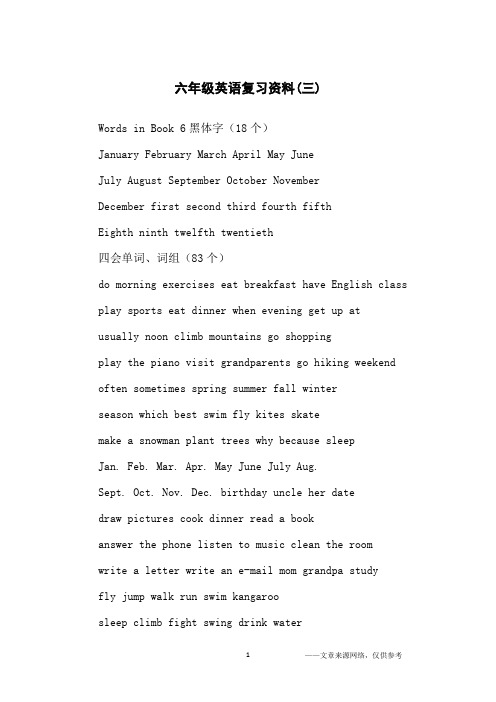
六年级英语复习资料(三)Words in Book 6黑体字(18个)January February March April May JuneJuly August September October NovemberDecember first second third fourth fifthEighth ninth twelfth twentieth四会单词、词组(83个)do morning exercises eat breakfast have English class play sports eat dinner when evening get up atusually noon climb mountains go shoppingplay the piano visit grandparents go hiking weekend often sometimes spring summer fall winterseason which best swim fly kites skatemake a snowman plant trees why because sleepJan. Feb. Mar. Apr. May June July Aug.Sept. Oct. Nov. Dec. birthday uncle her datedraw pictures cook dinner read a bookanswer the phone listen to music clean the roomwrite a letter write an e-mail mom grandpa studyfly jump walk run swim kangaroosleep climb fight swing drink watertake pictures watch insects pick up leavesdo an experiment catch butterflies honeycount insects collect leaves write a reportplay chess have a picnicWords in Book 7黑体字(16个)plane ship subway science museum northsouth east west tonight tomorrowtake a trip read a magazine go to the cinemamagazine dictionary vapour四会单词、词组(71个)by foot bike bus train how go to schooltraffic traffic light traffic rule stop wait get to library post office hospital cinema bookstorewhere please nest to turn right left straightthen next week this morning this afternoonthis evening comic book post card newspaper buyhobby ride a bike dive play the violin make kites collect stamps live(s) teach(es) go(es) watch(es) read(s) does doesn’t=does notsinger writer actor actress artist TV reporterengineer accountant policeman salesperson cleaner where work rain cloud sun stream seedcome from soil sprout plant should thenWords in Book 8四会单词(25个)taller shorter stronger older younger bigger heavier longer thinner smallerhave a fever hurt have a cold have a toothache have a headache have a sore throat matter sore nose tired excited angry happy bored sad。
小学六年级英语复习资料

小学六年级英语复习资料### 小学六年级英语复习资料#### 一、词汇复习1. 日常用语:- Greetings: Hello, Good morning, Goodbye- Expressions: Please, Thank you, Sorry2. 颜色:- Red, Blue, Green, Yellow, Black, White3. 数字:- 1 to 100, Thousand, Million4. 家庭成员:- Father, Mother, Brother, Sister, Grandfather, Grandmother5. 学校用品:- Pen, Pencil, Book, Notebook, Eraser6. 动物:- Dog, Cat, Elephant, Tiger, Bird7. 食物:- Apple, Banana, Rice, Noodles, Pizza#### 二、语法重点1. 一般现在时:- 描述日常习惯、事实或普遍真理。
2. 现在进行时:- 描述正在进行的动作。
3. 一般过去时:- 描述过去发生的事情。
4. 一般将来时:- 描述将来会发生的事情。
5. 疑问句:- 询问信息,使用疑问词(Who, What, Where, When, Why)。
6. 否定句:- 表达否定,使用助动词(Do/Does/Did not)。
#### 三、句型结构1. 陈述句:- I am a student.- She likes to read books.2. 一般疑问句:- Do you like apples?- Can he play the piano?3. 特殊疑问句:- What is your favorite color?- Where does she live?4. 祈使句:- Please close the door.- Don't forget to do your homework.#### 四、阅读理解- 阅读短文,理解大意,回答相关问题。
六年级英语上册unit3-7复习资料

Unit3 一.单词was (am,is的过去式) wasn’t=was not were (were的过去式) weren’t=were not excited 激动的exciting令人激动的moment片刻ago以前glasses眼镜film胶卷ground地面camera照相机earphone(s)耳机diary日记簿CD Walkman光盘随身听二.词组片刻之前a moment ago刚才just now一部手机a mobile phone一副眼镜a pair of glasses一卷胶卷a roll of film捡起它们pick them up在地上on the ground在日记本下面under the diary 在耳机附近near the earphones 在光盘随身听后面behind the CD Walkman想要拍些照片want to take some photos寻找她的照相机look for her camera 帮助她help her让我看看。
Let me see.体育运动日Sports Day观看赛跑watch a running race一场激动人心的比赛an exciting race三.句型1.Where’s your mobile phone ? It’s beside the diary.It isn’t there now . It was there a moment ago .你的手机在哪?在日记本旁边。
它现在不在那了。
片刻之前它还在。
2.Where are her glasses ? They’re behind the picture .They aren’t there now . They were there just now .她的眼镜在哪里?在图画后面。
它们现在不在那了。
它们刚才还在那的。
3. Where were you just now ? I was in the playground.你刚才在哪里?我在操场上。
6A Unit3复习资料

Unit three【词汇】1. holiday 假日,假期2. National Day 国庆节3. call 打电话4. bund (上海)外滩5. Shanghai Museum 上海博物馆6. star 星星7. Great Wall 长城8. Palace Museum 故宫9. Summer Palace 颐和园10. Tian’anmen Square 天安门广场11. fashion show 时装表演12. excited 激动的,兴奋的13. paper 纸14. ask 问15. bottle 瓶子16. go well 进展顺利17. at first 开始,最初18. heavy rain 大雨19. museum 博物馆20. square 广场21. lake 湖泊22. fashion时尚的,时髦的23. cool 酷,真棒【词组或短语】1. National Day 国庆节2. Shanghai Museum 上海博物馆3. Great Wall 长城4. Palace Museum 故宫5. Summer Palace 颐和园6. Tian’an men Square 天安门广场7. fashion show 时装表演,时装秀8. go well 进展顺利9. at first 开始,最初10.heavy rain 大雨11. holiday fun 假日快乐12. come back to school回到学校13. after the National Day holiday国庆假日之后14. call you打电话给你15. at home 在家16. go to Shanghai去上海17. visit my aunt拜访我的阿姨18. go to the Bund去外滩19. visit the Shanghai Museum参观上海博物馆20. see many interesting things看见许多有趣的事21. How was your holiday? 你的假日怎么样22. great fun有趣的事23. our family我们全家24. go to a farm去农场25. near Star Lake在星星湖边26. pick some oranges摘一些橘子27. go fishing去钓鱼28. catch a big fish钓了一条大鱼29. want to give you the fish想要把鱼给你30. pick an orange for me为我摘只橘子31. talk about your travel experiences 谈论你的旅游经历32. want an orange from the tree想要树上的一只橘子33. three main school holidays三个主要的学校假日34. in the UK在英国35. the Easter holiday复活节假期36. the summer holiday暑假37. the Christmas holiday圣诞假期38. It is time for dinner. 该吃晚饭了。
六年级下册英语素材复习Unit3_人教PEP()

Unit 3 What would you like ?要练说,得练看。
看与说是统一的,看不准就难以说得好。
练看,就是训练幼儿的观察能力,扩大幼儿的认知范围,让幼儿在观察事物、观察生活、观察自然的活动中,积累词汇、理解词义、发展语言。
在运用观察法组织活动时,我着眼观察于观察对象的选择,着力于观察过程的指导,着重于幼儿观察能力和语言表达能力的提高。
单词唐宋或更早之前,针对“经学”“律学”“算学”和“书学”各科目,其相应传授者称为“博士”,这与当今“博士”含义已经相去甚远。
而对那些特别讲授“武事”或讲解“经籍”者,又称“讲师”。
“教授”和“助教”均原为学官称谓。
前者始于宋,乃“宗学”“律学”“医学”“武学”等科目的讲授者;而后者则于西晋武帝时代即已设立了,主要协助国子、博士培养生徒。
“助教”在古代不仅要作入流的学问,其教书育人的职责也十分明晰。
唐代国子学、太学等所设之“助教”一席,也是当朝打眼的学官。
至明清两代,只设国子监(国子学)一科的“助教”,其身价不谓显赫,也称得上朝廷要员。
至此,无论是“博士”“讲师”,还是“教授”“助教”,其今日教师应具有的基本概念都具有了。
1.食品类(hungry 饿的时候吃eat)单靠“死”记还不行,还得“活”用,姑且称之为“先死后活”吧。
让学生把一周看到或听到的新鲜事记下来,摒弃那些假话套话空话,写出自己的真情实感,篇幅可长可短,并要求运用积累的成语、名言警句等,定期检查点评,选择优秀篇目在班里朗读或展出。
这样,即巩固了所学的材料,又锻炼了学生的写作能力,同时还培养了学生的观察能力、思维能力等等,达到“一石多鸟”的效果。
sandwich三明治salad沙拉hamburger汉堡包ice cream冰淇淋2.饮料类(thirsty 渴的时候喝drink)tea茶milk牛奶juice果汁water 水3.形容味道类单词[来源:]fresh新鲜的healthy 健康的delicious美味的hot辣的sweet甜的4.其他类drink喝thirsty渴的favourite最喜欢的food食物onion 洋葱语音ow [au] cow 奶牛flower 花WOW 哇down 向下ow [əʊ] slow 慢的snow 雪yellow 黄色window 窗户句型[来源:]What’s your favorite fo od? 你最喜欢的食物是什么?My favourite food is fish.我最喜欢的食物是鱼。
- 1、下载文档前请自行甄别文档内容的完整性,平台不提供额外的编辑、内容补充、找答案等附加服务。
- 2、"仅部分预览"的文档,不可在线预览部分如存在完整性等问题,可反馈申请退款(可完整预览的文档不适用该条件!)。
- 3、如文档侵犯您的权益,请联系客服反馈,我们会尽快为您处理(人工客服工作时间:9:00-18:30)。
把这三个句子给你们讲一遍,因为我不讲得那么细,只是给你们介绍一下。
主要是让你们明白它有多么简单!!
比如,我们看这个句子:
The man is a teacher.
这句话怎么翻译?
—这个人是一个老师。
The man 是什么意思?Is是什么意思?Teacher是什么意思?
如果有人说:Is是“是”的意思,
那就完啦。
这是什么人?农民!!为什么?——他(她)在学英语的第一天就被老师一脚踹粪坑里了,得花一辈子从那粪坑里往外爬。
因为把“is”当“是”了。
这样就惨啦!!“Is”是“是”,they are teachers的“are”也是“是”。
那英语就没办法学了。
这样的话:
“How are you ? ”就变成“怎么是你”了。
“How old are you? ”就变成“怎么老是你”了。
“天天向上”就“good good study,day day up.”
“人山人海”就“people many people see. ”
“给你点颜色看看”就“give you color to see see.”
结果全是拿英文单词按中国人的思维方式拼出来的句子,翻译出来的句子全是这玩意,根本不是英文。
所以我们以前是用什么思维方式在学英文?农民!!
我们再来看看“渔民”的思维方式。
咱们看下面几个句子:
这个人是一个老师。
(英文怎么说?)——The man is a teacher.
刚好和中文对上“人——man 是——is 老师——teacher”
再看这个句子:
他很忙。
——中国人说“他很忙。
”
中文有“是”吗?
——没有!
英国人怎么说?He is busy.
英文要不要“is”?一定要有。
第三个句子:
她在教室里。
中文里有“是”吗?
——没有。
英文怎么说?
——She is in the classroom。
你看,中文一会有是,一会没有。
而英文怎么样?非有这个“is”不可。
那我们首先就要搞清楚,英国人为什么非要跟这个“is”没完没了?
我们说过了,英国人只有三个句子,它只会说三句话。
那么,一个民族只会说三句话的时候,首先就要区分出来这三句话。
靠什么来区分呢?
我举个例子,开奥运会,有三个国家参加奥运会。
老远,我们就说美国队出来了。
怎么知道美国队出来了?美国队举着美国国旗。
我们说英国队出来了,英国队举着英国国旗。
一看五星红旗,我们就知道谁出来啦?中国队。
英国人说每一句话的时候它最在乎谁?在乎那面旗子。
英文的第一面旗子
就是“is 、am、are”当你发现一个句子有“is、am、are”的时候,你就知道英国人想说什么啦!!英国人想说:
当“is”后面是名词的时候,它表示是什么。
——什么人、什么东西是什么。
当“is”后面是形容词的时候,它表示怎么啦。
——什么人、什么东西怎么啦?
当“is”后面是一个介词加名词(我们叫它介词短语)的时候,它表示在什么地方。
——什么人、什么东西在什么地方。
要是你明白了上面说的,你就明白了英语的三分之一。
这种句型就叫:主系表。
“is/am/are”就是这个句型的灵魂。
这个句子就是三个单词:主、系、表。
主语永远是名词,人或者物。
表语呢?有三种可能性:
一种是“名词”,表示“是什么”。
二是“形容词”,表示“怎么了”。
三是“介词短语”,表示“在什么地方”。
掌握了这个句型,就掌握了英语的三分之一。
剩下的就是要牢牢记住这个“be(is/am/are)"的变化。
比如:现在时——is/am/are
过去时——was/were
将来时——will be
完成时——have been
过去完成时——had been
将来完成时——will have been
非常简单,一下子就记住了。
你们看:
你有钱。
——You are rich.
你将来有钱。
——You will be rich.
完成时呢?——You have been rich.
过去完成时——You had been rich.
将来完成时——you will have been rich.
过去将来完成时——You would have been rich.
·
一共就八句话,这个句型就学完了。
学这么点就学了英语的三分之一你们之前为什么出问题了?咱们来看看问题出在哪··
看这个句子:
The man is a teacher.
Man 是什么词?——名词
Teacher 什么词?——名词
in the classroom。
Classroom什么词?——名词
我们来看看英语是怎么变长的。
因为英语一变长,咱们就乱了。
比如我说:从英国来的那个人在教室里。
(从这里有些人就开始乱啦)“英国来的”我们用什么介词?
——From “
从英国来”——From England
从英国来的(介词短语)那个人在教室里。
——从这句话可以看出,咱们中国人“在用介词短语做定语的时候,修饰哪个名词放在哪个名词的前面。
”
The man from england(介词短语)is in the classroom。
——英国人“在用介词短语做定语的时,放在修饰名词的后面。
”
再看:she is in the classroom. 她在教室里。
她在二楼的教室里。
用英文怎么说?
——she is in the classroom on the second the floor.
“on the second the floor”为什么放在“classroom”后面?修饰哪个名词放在哪个名词的后面。
大家按照上面说的,试着把下面句子翻译成英文试试,体会一下:
这个人在二楼的教室里。
——
The man is in the classroom on the second floor.
这个人在大楼的二层的教室里。
——The man is in the classroom on the second floor in the building.
哪个“building”? In the school ;
哪个“school”? In shanghai;
哪个“shanghai"?
In china.这个句子就这么一下子长下去。
你们把它翻译成中文,再体会体会英文,一下子就全明白了。
中文怎么说:这个人在中国上海的学校大楼的二楼的教室里。
——我们关心的是这个人在哪?而我们的语言中偏偏把这个人放哪啦?放后面。
而英文放哪?“the man is in the classroom”。
英文把重要的放前面。
比如:
桌子上的钱是我的。
——中国人先说桌子上,然后再说钱是我的。
而英国人怎么说?“Money on the desk is mine.
它把“money "放前面。
钱重要还是桌子重要?钱!!
为什么我们中国人把不重要的放前面?
因为我们是农民。
农民为什么有这种毛病?农民是春天播种,秋天收获。
他收了粮食以后,这个农民是先吃好的还是先吃次的?先吃次的。
好粮食可以存,一直存到第二年的秋天。
次粮食是不能存的,所以它一直先吃次的,吃吃吃吃,吃到好的,吃到第二年秋天。
要不然我们这个民族就饿死了。
而渔民是怎么样的?
渔民三百六十五天,天天能打到鱼。
打到鱼他先吃好的还是先吃次的?先吃好的。
为什么?这鱼不能放啊,第二天它臭了,晚上就臭了。
所以它先吃好的,把坏的扔了。
所以它的思维,你看它总是把好东西放哪?放前面,重要的总是放前面。
它的生活习惯决定了它的思维方式。
包括我们中
国人的饺子。
吃过饺子吧?哪里好吃?馅!!馅在里面呢,它把好东西包里面。
吃过包子吗?吃过馅饼吗?吃过月饼吗?吃过汤圆吗?吃过馄饨吗?你们看,中国人都把好东西干嘛?包里面了。
它的习俗和我们的思维模式一模一样。
你们看英国人吃什么?吃过批萨吗?馅在哪?表面!!吃过蛋糕吗?奶油在哪?表面!!一个民族的地理环境,就决定了一个民族的思维方式,思维方式就决定了它的语言特点。
到此为止,我们学了英语的三分之一了。
这个句子最重要的就是主系表,那个“Be(is/am/are)"。
然后这里把我们搞糊涂的是什么?英国人用介词短语做定语放在哪?修饰哪个名词放哪个名词的后面。
一个一个往后放。
